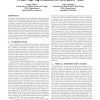Free Online Productivity Tools
i2Speak
i2Symbol
i2OCR
iTex2Img
iWeb2Print
iWeb2Shot
i2Type
iPdf2Split
iPdf2Merge
i2Bopomofo
i2Arabic
i2Style
i2Image
i2PDF
iLatex2Rtf
Sci2ools
ICCD
2003
IEEE
2003
IEEE
Virtual Page Tag Reduction for Low-power TLBs
We present a methodology for a power-optimized, software-controlled Translation Lookaside Buffer (TLB) organization. A highly reduced number of Virtual Page Number (VPN) bits sufficient to perform physical address translation is efficiently identified and used when performing TLB lookups, delivering significant power reductions. Information regarding the virtual address space of the program code and data provided by the compiler is augmented with information regarding the dynamically linked libraries and data allocated run-time by the loader, the dynamic linker, and the memory manager. The hardware support needed is constrained to disabling bitlines of the tag arrays associated to the I-TLB and the D-TLB. Algorithms for identifying the reduced VPNs for power optimized TLB operations together with the required OS support are presented.
Related Content
| Added | 16 Mar 2010 |
| Updated | 16 Mar 2010 |
| Type | Conference |
| Year | 2003 |
| Where | ICCD |
| Authors | Peter Petrov, Alex Orailoglu |
Comments (0)

